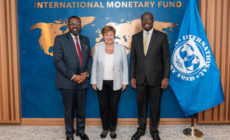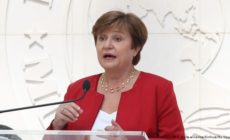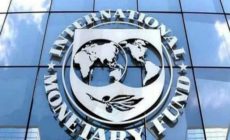IMF revise Ghana’s GDP growth to 3.3% – Slowest since 1994
- Posted on
- Comment
. The slowest since 1994
THE International Monetary Fund (IMF), in its latest forecast, has said Ghana’s economy will grow by 3.3% this year, the slowest since 1994, a report on the Third Review under the Extended Credit Facility Arrangement posted on the IMF website has revealed.
The 121-page report was posted on October 3, 2016.
This projection is far below the 4.1% growth contained in the mid-year budget review as well as below the 3.9% growth for 2015.
Joel Toujas-Bernate, the IMF’s mission head in Ghana, told journalists through a video conference call from Washington yesterday that inflation would rise to 17.5% by the end of the year, from 16.9 percent in August.
In the report, the fund revised Ghana’s budget-deficit forecast for 2016 to 5.2% of GDP from 4.8% in May, due to oil-revenue shortfalls.
“Implementation of the ECF-supported program by the Ghanaian authorities continues to be broadly satisfactory, but the economic outlook remains challenging.
There has been progress in stabilising the macroeconomic situation and reducing financial imbalances, but fiscal risks remain elevate” the Fund added.
The fund cited uncertainty over the resumption of oil and gas output at a key field weighs on the country’s prospects for next year.
In the guidelines for the preparation of the 2017–2019 budget, government admits that any unexpected crude oil price decline below what the fiscal frame work assumes and the possible in situ or offsite repairs of the Floating Storage and Offloading vessel (FPSO) Kwame Nkrumah Kwame Nkrumah in 2017, which could take between 8 to 12 months will have negative implications for the achievement of the medium term fiscal deficit targets.
The $918 million bail out programme aims to restore debt sustainability and macroeconomic stability in the country to foster a return to high growth and job creation, while protecting social spending.
The IMF said payroll control reforms have also been delayed in view of some domestic resistance, but the authorities are now implementing a revised strategy to achieve the desired level of payroll control for all agencies.
Outlook remains difficult
The IMF warned that the outlook remains difficult and the balance of risks is tilted to the downside.
Fiscal Policy, Financing, and Debt Management
The report said domestic revenue mobilization during the second half of the year will be challenging, however, reflecting weak economic activity, lower-than-expected oil prices, and lower-than expected re venue yield from recent measures.
To offset the impact of low revenues, the authorities have reduced domestically-financed capital spending by delaying transfers to the Ghana Infrastructure Fund and moderately curtailing spending on goods and services.
Freeze on recruitment
They also intend to maintain strict control on spending on wages and salaries by enforcing compliance with the policy on net freeze on recruitment.
Recent Economic Developments
According to the IMF, fiscal adjustment for 2015 surpassed expectations with the overall deficit declining from 10.1% in 2014 to 6.9% of GDP, against a target of 7.5%.
It noted that the performance largely reflected significant scaling back of capital expenditures and limitations on mandatory transfers to statutory funds.
However, further fiscal consolidation efforts for the period January-June 2016 have been hindered by relatively weak growth, resulting in lower-than-expected revenues.
The current account deficit narrowed in 2015 and gross international reserves strengthened marginally in 2015, before declining in the first half of 2016 in line with seasonal trends.
The exchange rate has remained largely stable.
During the review, adjustments were made to the program to ensure that it remains on track to enhance its prospects of success.
In this context, the Executive Board also granted waivers, including minor deviations in a few program targets.
“To ensure that the gains from fiscal consolidation are sustained over the medium term, the government needs to continue its efforts to effectively implement a wide range of ambitious reforms.
“These include measures to broaden the tax base and enhance tax compliance, strengthen control of the wage bill, and enhance public financial management (PFM).
“In this regard, the recently adopted PFM legislation is an improvement over previous laws.
“Steps taken to address SOEs financial problems are welcome, but more work is needed to reduce risks to the economy, the financial sector, and the government budget from their underperformance.
“The Bank of Ghana (BoG) should maintain a tight monetary policy stance to bring inflation back to target. Recent amendments to the BoG Act have introduced some improvements to central bank governance, but continued scope for central bank financing of the government and government influence on central bank operations remain significant shortcomings.
“The authorities’ commitment to maintaining zero-BoG financing of the government under the program and to introducing additional amendments to the BoG Act in 2017 are welcome.
“Full and timely implementation of the BoG’s roadmap for the banking system is essential to address financial sector risks.
“Although the adoption of the two new banking sector laws strengthens the authorities’ toolkit, the new legislation warrants further improvements to enable the authorities to effectively safeguard financial stability”, the report said.
By Elvis DARKO and Isaac AIDOO, Accra











 (Selorm) |
(Selorm) |  (Nana Kwesi)
(Nana Kwesi)